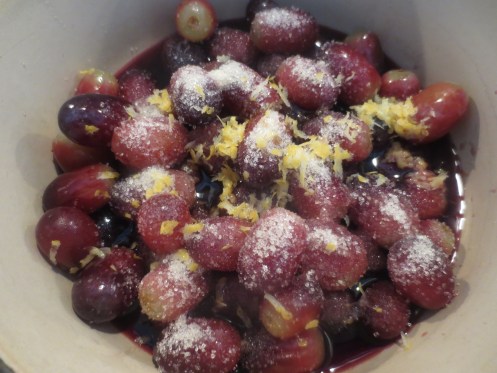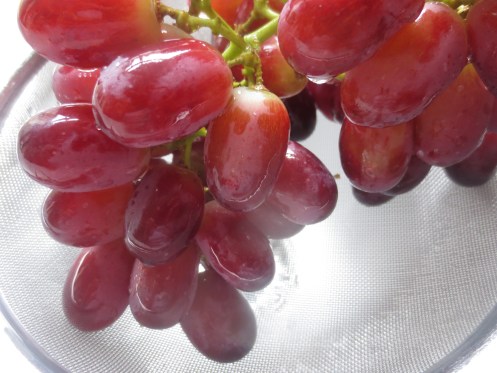When I was in Crete almost two years ago, I was always given a little ‘sweet’ – dessert – at the end of my meal with my coffee, even if I hadn’t ordered one. Usually it was some fresh fruit – grapes or melon, maybe – or perhaps a slice of halva. In the evening I was given a glass of raki – local digestif – too, often made by the restaurant. In one of the tavernas in Istron, where I was staying, I was always given a bowl of Greek yoghurt topped with a grape compôte at the end of the meal. I wrote about this in my Memories of Istron post when I got home and vaguely gave the ‘recipe’. To be honest, it’s so simple it’s barely a recipe. And I had guessed it. I was therefore surprised when I was looking through my Rick Stein: From Venice to Istanbul book last night, trying to find a dessert for the Greek meal I was planning for today, to find ‘Greek Grape Spoon Sweets with Lemon’ – and a photo of just the kind of ‘sweet’ I was given at Zygos Taverna in Istron. I hadn’t realised it had an actual name; was a ‘recipe’.
Of course, I couldn’t leave the ‘discovery’ there and so googled ‘spoon sweets’. I discovered they are served as a measure of hospitality in Greece, but also parts of the Middle East and Balkans too. They are preserves, a kind of jam, and are indeed often served on spoons with coffee. They are made from many kinds of fruit and the fruit should retain its original shape – not be lost in a mush as many ‘jams’. Often they are served just as they are – a kind of dessert canapé, I suppose – but may be used as a topping for yoghurt – as I had it – or ice cream. Well, having found all this information, I just had to do the grape spoon sweets for the meal – even though I’ve done it a few times since the Crete trip, and I know Jonathan has made it too for friends. I didn’t follow Rick’s recipe but made it as I’ve done before, based on what I understood of instructions at the Cretan restaurant. I made it with Total Greek yoghurt because you really do need the real thing, I think, not Greek-style yoghurt which often has thickeners and other things added. I also bought a pack of little shortbread biscuits from Paul Bakery to go with it – just because I couldn’t resist them when in the bakery this morning. They are, of course, not Greek! But I thought they’d be a nice accompaniment anyway.
Greek Grape Spoon Sweet
- 500g sweet seedless red grapes
- glass red wine
- 2 heaped dessertspoons sugar
- 1 teaspoon vanilla paste
- zest of ½ lemon
- Greek yoghurt
Wash the grapes, pull them gently away from the stems, and put in a saucepan with all the other ingredients, except the yoghurt. I used a minimum amount of sugar as I don’t like to use a lot and nor do I like very sweet things, but you may like to add a little more and it would give a more syrupy consistency.

Bring to the boil and then gently simmer, stirring occasionally, for about 40 minutes. Lift the grapes from the pan with a slotted spoon into a colander or sieve over a bowl. Then hard boil the remaining juice for a couple of minutes to thicken, adding any extra juice that drops through the sieve back into the pan.
Tip the grapes into the bowl, pour over the hot syrup and leave to cool. Then cover in cling film and put in the fridge until needed.
That done I got on with the rest of the meal, making a moussaka, which is one of our favourite dishes. As Freddie (15 months now) was eating too, I salted the moussaka at the end of each stage (meat, béchamel, etc.) so that I could put a small portion aside separately for him with no salt.
I also bought some olive fougasse in Paul because I love it so much, and while that is of course another French addition to this Greek meal, I did serve it with best quality Cretan olive oil that I bought locally at Liquid Gold Cave.
Family lunches are a flexible affair now to accommodate Freddie’s midday nap, so we planned on a late lunch at around 3pm. The great thing about moussaka is that it is very accommodating! It will keep on a low heat for ages and actually improves, I think, rather than suffers. And then of course it needs to come out of the oven and stand for a while to cool. The Greeks don’t eat piping hot food and dishes like moussaka are served almost lukewarm at times. I think you can appreciate the taste better this way but it’s also healthier – very hot food isn’t good for the digestion.
We ate the fougasse with the oil, Kalamata olives and some beetroot hummus that Jonathan had made first, with glasses of prosecco (water for Freddie!). Then we had the moussaka with a big green salad of rocket, baby gem and fennel, and some red wine. Freddie seemed to love his unsalted version of the moussaka and it was still very tasty because of all the good things in it. Then, after a suitable gap – for it was a Bank Holiday Monday and even if the weather wasn’t playing (it’s been cold, grey and windy in London), we were still in relaxed mode – I put the dessert – the Greek Grape Spoon Sweets – together at the last moment, and transferred the little shortbread to an old French saucer I bought in Normandy (well it’s nice to have that effect).
Freddie was given the yoghurt with just a little of the compôte juice – and, as a special treat, one of the shortbread! We all loved the ‘spoon sweets’. It’s amazing how good such a simple dish can be. And with its memories of beautiful Crete, it brought a little sunshine into our otherwise grey bank holiday!












Your meal looks and sounds delicious, even I was transported to sunny Greece just from reading!
Tania @ http://www.thegammonkitchen.wordpress.com
Thank you! 🙂